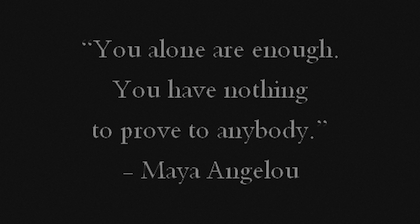I used to think that self-worth was something that you had to earn; as if you had to prove yourself to acquire value and qualify as a worthy human being. I thought that self-worth was rooted in the external; dependent on personal and professional outward “success”. Over the last year or so, I’ve come to realize that this ideology is deeply flawed. I had it wrong all along.
Self-worth is not something you accumulate, it is inherent.
Your sense of worth shouldn’t depend on external validation, it should come from within. If you don’t accept yourself and recognize your inherent value, you will never feel good enough, regardless of how hard you try and how much “success” you achieve. Ultimately, you will never be truly happy.
Sure, external accomplishments might make you feel good about yourself momentarily, but relying solely on accomplishments to fuel your self esteem is problematic. If you equate personal success with self worth, then you may equate failure with not being good enough. If you subscribe to this type of mindset, it is harder to recover from failure or a setback. When you “fail”, you may assume it’s due to your lack of abilities, when in reality its not. Everyone experiences some form of failure in life, it is important not to let the setback damage your self confidence and realize that failure and struggle is part of being human.
Moreover, no amount of validation and love from others can replace the need for you to love yourself. Yes, it feels great to receive compliments from your friends and family and sure, being loved for who you are feels wonderful. However, when you give others the power to determine how you feel about yourself, the moment someone starts to criticize you and the moment someone dislikes you or rejects you, your world starts to crumble. This mentality results in a fluctuating self-esteem; one moment you feel great about yourself, the next you’re wallowing in self-loathing. Such a mindset is unsustainable and does not guarantee long-term happiness.
Ultimately, our self-worth shouldn’t be determined by things beyond our control. We can’t control what others think and we can’t control what happens to us, we can only control how we feel about ourselves. The truth is, we are all deeply flawed, but worthy of (self) love anyway.






